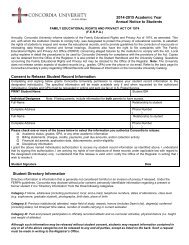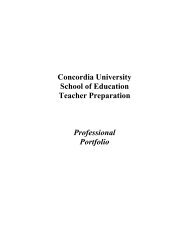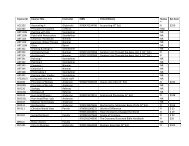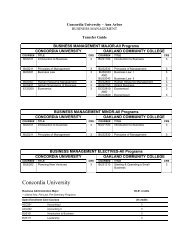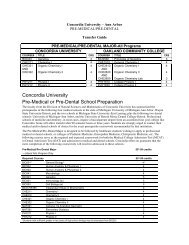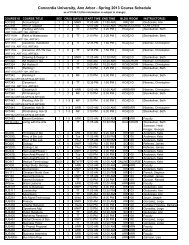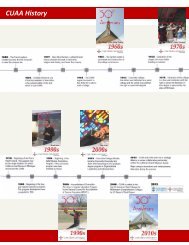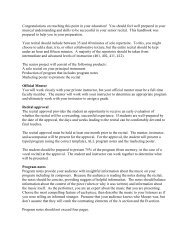2009â2010 Academic Catalog - Concordia University Ann Arbor
2009â2010 Academic Catalog - Concordia University Ann Arbor
2009â2010 Academic Catalog - Concordia University Ann Arbor
Create successful ePaper yourself
Turn your PDF publications into a flip-book with our unique Google optimized e-Paper software.
<strong>Concordia</strong> <strong>University</strong> <strong>Ann</strong> <strong>Arbor</strong> 2009–2010 <strong>Academic</strong> <strong>Catalog</strong><br />
FRE102 Elementary French II credits: 3<br />
Continuation of Elementary French I. Prerequisite: FRE101<br />
GEO200 Human Geography credits: 3<br />
Students use natural environment concepts to help explain the spatial distribution of human activities.<br />
GEO321 Ethnographic Geography credits: 3<br />
Students explore the interplay of the natural environment, social organization and culture. Emphasis is on the diverse ways that<br />
ethnicity emerges as various human groups adjust to locales in which they live. Prerequisite: GEO200<br />
GER101 Elementary German I credits: 3<br />
Introduction to German grammar and syntax; selected readings in German and conversations.<br />
GER102 Elementary German II credits: 3<br />
Introduction to more advanced German grammar and syntax; more selected readings in German and conversations. Prerequisite:<br />
GER101<br />
GRE201A Elementary Greek I credits: 4<br />
Students learn the morphology, syntax, and vocabulary of ancient Greek and achieve an initial level of skill in reading and writing<br />
basic sentences. One year of any high school or college foreign language study is recommended.<br />
GRE202A Elementary Greek II credits: 4<br />
Continuation of GRE201. Students learn the morphology, syntax, and vocabulary of ancient Greek and achieve increasing<br />
competence in the skills in reading and writing passages. Prerequisite: GRE201A<br />
GRE316 Greek Readings credits: 2<br />
This course serves as a vehicle for development of skills necessary in translation of ancient Greek texts, including an<br />
understanding of their historical and cultural background. Students strengthen and expand their knowledge of Greek morphology,<br />
syntax, and vocabulary and grow in using linguistic and academic resources. Prerequisite: GRE202A<br />
GRE483 Senior Project credits: 1<br />
Students combine research and practical implementation of theories and concepts to develop an individual project. Prerequisites:<br />
Senior standing & instructor's permission<br />
GST150 Intro to Campus Information Systems credits: 1<br />
Introduces students to the university's networked environment including integrated e-mail, web based course resources, and<br />
library and research technologies to support the students in their academic work. (ADP)<br />
GST151 Introduction to Campus Computing credits: 2<br />
Introduces students to the college's networked environment that utilizes e-mail, the World Wide Web, and other communication<br />
technologies to support the faculty and students in their instruction and learning. Students will achieve beginning level<br />
information and technological literacy to enable them to be successful with course assignments throughout their college program.<br />
GST170 The First Year of College credits: 3<br />
The First Year of College addresses the skills necessary for college students to succeed in the <strong>University</strong> and beyond. It is<br />
designed to meet the objectives of the General Studies Curriculum for technology proficiency and academic success in the<br />
General Studies Core. The course will introduce students to liberal arts education and attempt to awaken intellectual curiosity,<br />
while empowering them with modern tools for college success.<br />
HEA483 Senior Project credits: 2<br />
A culminating experience in which the student uses the skills and knowledge acquired in her or his previous preparation in the<br />
execution of an original (to the student) project dealing with an issue, question or problem of importance in the natural sciences or<br />
mathematics. Results of the project are communicated in an oral public presentation and a written paper. Senior standing is<br />
required.<br />
HEB201A Elementary Hebrew I credits: 4<br />
Students are introduced to Biblical Hebrew morphology, syntax, and vocabulary leading to elementary translation of practice texts<br />
and the Hebrew Bible. Ancient culture and history relating to the Old Testament are also introduced.<br />
HEB202A Elementary Hebrew II credits: 4<br />
This course continues the study of Biblical Hebrew morphology, syntax, and vocabulary with an introduction to the reading of<br />
Biblical Hebrew prose. Prerequisite: HEB201A<br />
HEB316 Hebrew Readings credits: 2<br />
Through exposure to a variety of texts, students will further develop the skill of reading the Hebrew Old Testament with care and<br />
precision by strengthening and expanding their knowledge of Greek morphology, syntax, and vocabulary. Ancient culture and<br />
history will continue to be explored. Prerequisite: HEB202A<br />
Pg. 106 of 118



